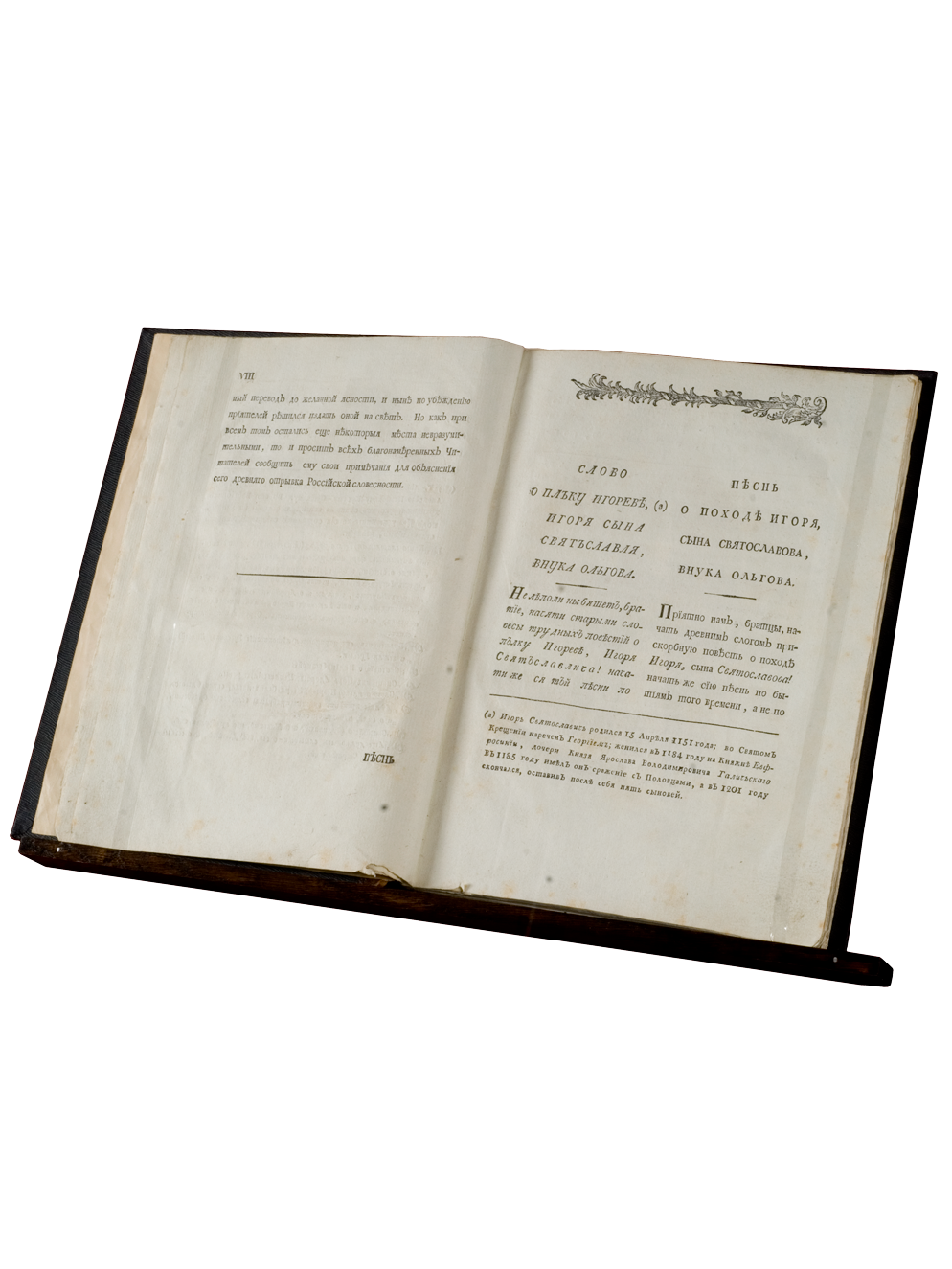“The Tale of Igor's Campaign”(“The heroic song of the campaign against Polovtsians of apanage prince of Novhorod-Siverskyi Igor Svyatoslavich”)

The first edition of the outstanding piece of ancient Russian literature of the XII century. The handwritten manuscript of “The Tale of Igor's Campaign” was found in 1790-ies and bought by famous collector of antiquities A.I. Musin-Pushkin in whose home the priceless manuscript burnt during the fire of 1812. Thankfully the poem was copied for the empress Catherine the Great and in 1800 “The historical song of the campaign against Polovtsians of the apanage prince of Novhorod-Siverskyi Igor Svyatoslavich” was published for general readers. Today the first edition of “The Tale of Igor's Campaign” is a rare book, but in particular thanks to it the text of the outstanding literary works of the XII century has remained till nowadays.
The name of the author of “The Tale of Igor's Campaign” is unknown for us, but it is likely he was a member of the prince’s surrounding. The nameless writer is worried about the fate of his native land that was torn apart by princely strife. He claims the need in uniting efforts of princes against the external enemy. Glorifying the valour of Russian warriors, the author of “The Tale of Igor's Campaign” blames Igor – the brave and courageous, but reckless and short-sighted apanage prince who tried fighting against foreigners alone. The call for unity and protection of the native land addressed to Russian princes – “Bar the gates of the prairie ”, had been relevant for many years after these described events.
The last two decades of the XII century in history of the Old Russian state are rightfully called the epoch of “The Tale of Igor's Campaign”. In this brilliant poem, that is definitely a gem of Old Russian literature, a bright image of life of Rus’ during the fragmentation period is created. Internal strife for princely thrones and being the anteriority in Rus’ opened wide opportunities for nomads who had always willed to conquer rich Russian lands. In that period on the arena of the political struggle the dangerous enemy for the old Russian state were Polovtsy that were wandering in steppes of the Dnieper and the Don regions. Relations of Russian princes and them were different: from marital and military unions to overt acts of war.
Since the middle of the XI century the Dnieper river region Polovtsian Hords, led by Bonyak and Tugorkan, repeatedly ravaged southern Rus’ lands. In the second half of the XII century Russian lands were constantly suffering from the Don nomads led by the energetic khan Konchak, named in the annals the damned and godless destroyer.
In the 80-ies of the XII century the prince of Kiev Svyatoslav Vsevolodovich, despite princely strife, managed to unite powers of Kiev, Volhynian, Galician, Chernigov, Pereyaslavl and Smolensk lands and arrange series of successful campaigns against Polovtsy. Having learned about the victories of Svyatoslav over Polovtsy in March and April 1185, Novgorod-Seversky Prince Igor Svyatoslavich addressed his subjects with words "Aren’t we princes? Let's start a military campaign and gain ourselves some glory too."
The military campaign ended with an unprecedented defeat of the Russian army and the capture of four apanage princes at once. The terrible defeat could not but cause serious reflections on its causes and serious consequences.
The name of the author of “The Tale of Igor's Campaign” is unknown for us, but it is likely he was a member of the prince’s surrounding. The nameless writer is worried about the fate of his native land that was torn apart by princely strife. He claims the need in uniting efforts of princes against the external enemy. Glorifying the valour of Russian warriors, the author of “The Tale of Igor's Campaign” blames Igor – the brave and courageous, but reckless and short-sighted apanage prince who tried fighting against foreigners alone. The call for unity and protection of the native land addressed to Russian princes – “Bar the gates of the prairie ”, had been relevant for many years after these described events.
Prince Igor Svyatoslavich was born in 1150 (in the year of the famous campaign he was 35) and in 1178 he took the Novhorod-Siverskyi throne. At his time Igor was friends with the Polovets khan Konchak and with him he fought against neighbor princes using Polovtsy in princely strife. But starting from the 1183 he was fighting against the same Konchak who attacked Rus’ and made several independent campaigns to the Polovtsian land.
On Tuesday, April 23, 1185 Igor Svyatoslavich's druzhina (squad of warriors) made a campaign to Polovtsian lands. His brother Kursk-trubchevsky Prince Vsevolod Svyatoslavich supported him. The campaign was joined also by sons of Igor - Svyatoslav and Vladimir. When on 1 May troops approached the Russian borders, there was a solar Eclipse. "The sun blocks his way with darkness. Night, moaning ominously unto him, awakens the birds; the whistling of beasts " - writes the author of "The Tale of Igor's Campaign". Despite this warning sign, Igor continued to move deep into the Polovtsian steppe. On May 10, he met united Polovtsian forces led by Khan Konchak. A terrible three-day slash on the banks of the Kayala river ended with the complete destruction of Russian forces. Igor and several princes were captured, 15 of the soldiers slipped out of the encirclement, the rest perished in the "battlefield in Polovtsian lands that had never been heard of ".
The defeat of the army of Igor Svyatoslavich showed that the strength of one Duchy is not enough for an effective fight against the Polovtsy of Don. His failures showed the unfortunate consequences of a lack of unity. Igor suffers defeat only because he went alone. He acts according to the formula "we to ourselves and you to yourself." Defeat at Kale "discovered" the South-Eastern border of Russia with the steppe and the Polovtsy of Don continued to plunder not only border areas but also invaded the borders of Kiev land.
